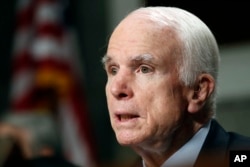U.S. Senate Majority Leader Mitch McConnell quickly faced resistance Tuesday to his plan to hold a vote on a complete repeal of the nation's health care law that would be delayed for two years.
McConnell announced the new approach as he opened the Senate session, a day after the latest effort to overhaul the health care law collapsed. "We will now try a different way to bring the American people relief from Obamacare," he said, referring to the Affordable Care Act, passed during former President Barack Obama's first term.
Republican Senators Shelley Moore Capito of West Virginia, Susan Collins of Maine and Lisa Murkowski of Alaska announced their opposition, while Rob Portman of Ohio and others expressed skepticism.
President Donald Trump, who has repeatedly called for repealing and replacing Obamacare, told reporters at the White House he was "disappointed" by the collapse and added that Republicans would let the current law disintegrate.
"I'm not going to own it. I'm going to tell you the Republicans are not going to own it," he said. "We'll let Obamacare fail, and then the Democrats are going to come to us and they're going to say, 'How can we fix it?'"
McConnell's latest approach came after two more Republican senators, Jerry Moran of Kansas and Mike Lee of Utah, refused late Monday to support the latest measure to dismantle the current law. Their decision raised to at least four the number of Republican "no" votes, two more than McConnell could afford to lose in the face of unanimous Democratic opposition, given that Republicans hold a 52-46 advantage over Democrats in the chamber.
Moran and Lee issued separate statements describing the legislation as failing to go far enough in repealing the existing law and not doing enough to control rising costs.
Other Republicans have opposed the overhaul because of worries it could cut health insurance for millions of people, especially narrowing coverage under Medicaid, the government's health care program for poorer Americans.
The failure was the second in as many months for McConnell, who had to cancel a vote on an earlier version in June when its defeat became inevitable.
In one of a series of tweets Tuesday morning, Trump called on Republican lawmakers to exercise a procedural maneuver, known as the nuclear option, which lowers the threshold for approving Senate legislation from a supermajority of 60 votes to a simple majority of 51, even though the 51 votes were out of reach.
Vice President Mike Pence told members of Congress to "do their job" and replace Obamacare with a new plan or revisit legislation previously crafted in the House and Senate. Speaking to the National Retail Federation, Pence said inaction on health care "is not an option."
On Monday evening, McConnell initially unveiled the plan to repeal the bill passed by the House of Representatives earlier this year, with an amendment delaying implementation for two years.
McConnell said the approach would allow for a "stable transition" to a system that gives Americans access to "quality, affordable care."
Congress passed a similar bill in 2015, but with Obama still in office, there was certainty he would veto it instead of repealing his own program.
Some lawmakers reacted to Monday's news by urging a bipartisan approach to addressing the health care system.
Among them was Republican Senator John McCain of Arizona, who said Congress should not repeat what he called the mistake of the Obama-era law that was passed under Democratic control of both chambers without Republican support.
"The Congress must now return to regular order, hold hearings, receive input from members of both parties, and heed the recommendations of our nation's governors so that we can produce a bill that finally provides Americans with access to quality and affordable health care," McCain said.
Senate Democratic leader Chuck Schumer of New York said the failure of the latest Republican bill proved that its core was "unworkable."
"Rather than repeating the same failed, partisan process yet again, Republicans should start from scratch and work with Democrats on a bill that lowers premiums, provides long-term stability to the markets and improves our health care system," Schumer said.









